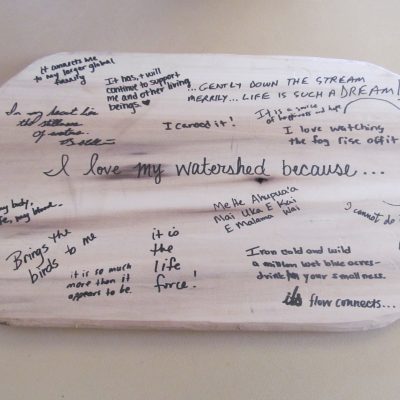Over 170 people participated in Rooted and Grounded: A Conference on Land and Christian Discipleship, offered at Anabaptist Biblical Mennonite Seminary September 18-20. Here, we offer a snack-size review of some of the questions encountered there.
1. What is your own “place” like?
The Rooted and Grounded conference included a Watershed Discipleship track where workshops were rooted in a particular place such as African-American neighborhoods in Detroit or the Little Campbell Watershed in British Columbia.
This anecdote from Matthew Humphry’s workshop, Lived Theology in the Little Campbell Watershed, illustrates the need to better understand the land under our own feet:
An indigenous person asked an American, “What is your homeland like?”
After struggling to answer the question several times and not succeeding, the person replied, “In America, we have careers, not places.”
In Humphry’s “homeland,” salmon are key to understanding the local ecology.
2. What are some friendly, failure-free ways my congregation can begin to explore creation care?
In Marie Fleming’s very practical workshop, “Making the Most of Every Growing Space,” she shared ideas from her own experiences in two congregations. Here are a few examples:
- For a children’s sermon: Bring in a dead bouquet of native flowers and say to the children, “This may look like yesterday, but it is actually tomorrow.” Shake out the seeds and talk about seed saving and God’s care for wildflowers.
- When I was Young in the Mountains: In Cynthia Rylant’s classic book by this title, the narrator reminisces about outdoor experiences in an Appalachian setting. Have people develop their own sense of place by naming and remembering their own childhood ecosystems. Everyone then makes a page entitled, “When I was young in ___________.
- Sustainable Skills Series: Hold a summer Christian education class based on skills present in your congregation that someone is willing to teach. Recycling various materials, preserving food and gardening are some examples. Rotating leadership should make it easy to find teachers.
Fleming observed that since most people like to garden and everyone has a special place in nature, these ideas work well with nearly everyone.
3. Are individual actions effective in addressing care for the earth?
Dr. Randolph Haluza-DeLay, a sociologist from Edmonton, Alberta, brought a social science lens to this question in a workshop entitled, An Environmental Sociologist Reads Climate Change Theology. According to his discipline, values do not lead directly to behavior changes, individual actions have limited impact and theologians do not always ground their work in evidence-based theories of change.
While the workshop was perhaps more unsettling than conclusive, Haluza-DeLay did say that sociologists and theologians needed to work together more. He also advocated a “multi-scaled” approach to issues like climate change: working at it at all levels from the individual to the global. See his book, How the World’s Religions are Responding to Climate Change.
